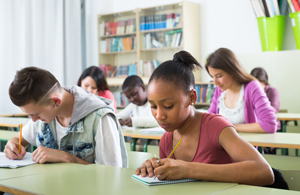
The widely anticipated appeal in the Detroit literacy lawsuit tossed out by a judge last June—the first case in the United States to assert that literacy is a constitutional right—was filed last week.
The appeal was filed with the United States Court of Appeals for the Sixth Circuit. In addition, multiple amicus curiae briefs were filed in support—most notably one signed by the International Literacy Association (ILA) and several other influential leaders in the education space.
In fact, it was ILA and Kappa Delta Pi, both early supporters of the case, that helped recruit this latest round of backers with an assist from the Advocates for Literacy Coalition. There are now 17 organizations attaching their name to the amicus brief, including the National Council of Teachers of English and the National Association of Secondary School Principals.
The purpose of the amicus brief: to not only request that the court reverse its earlier decision to dismiss the case, but also to highlight the multiple deficiencies the filers have found that they agree are “plausible allegations” against the defendants—the governor of Michigan and multiple education officials.
“We have long argued that literacy is a human right and therefore should be regarded as a constitutional right,” says Bernadette Dwyer, president of the Board of ILA. “We vowed to continue our support, and we’re happy to sign on to the appellate amicus brief in what may well turn out to be a landmark case.”
The federal class action lawsuit, dubbed Gary B. v. Snyder, was initially filed in 2016 on behalf of Detroit Public Schools students. Its main claim is that access to effective literacy instruction is a civil right under the U.S. Constitution, and that the state of Michigan, along with education officials, have failed to deliver on that right. The argument is that, because of unsafe conditions, a lack of resources, an unprepared teacher pool, and curriculum without a strong evidence base, Detroit students have been denied access to even minimum standards in literacy education.
When the judge dismissed the case earlier this year, he stated that literacy is of “incalculable importance,” but the plaintiffs failed not only to prove it fundamental but also to prove deliberate actions by the defendants that have led to these conditions.
Both this new amicus brief and the appeal detail accounts ranging from improperly trained teachers to unrepaired bullet holes, not enough desks and chairs to outdated reading materials, and a rampant rodent problem to broken heating systems.
These “concrete barriers,” the brief asserts, are the result of failure on the state’s part.
“The fact that the students in Detroit schools severely lag behind their peers in their literacy scores is a direct and unmistakable consequence of the state’s failure to provide the safe, nurturing environment that experts have identified as a necessary ingredient for learning,” the brief states.
Although the U.S. Supreme Court has never declared literacy to be a constitutional right, it opened the door for a future ruling by commenting in the 1973 case San Antonio Independent School District v. Rodriguez that some “identifiable quantum of education”—some small piece—might be a constitutionally protected prerequisite to the meaningful exercise of other legal rights.
It is argued that basic literacy is that “identifiable quantum,” the indispensable skill required to exercise the First Amendment and other rights.
“[We] have also seen firsthand both the great benefits that public education provides to students as well as the devastating consequences that students suffer when their education systems fail,” the brief states. “Denial of access to literacy has cascading effects on students that can disadvantage them throughout their lives.”
The following organizations have signed the amicus brief with ILA: American Council on the Teaching of Foreign Languages, Association for Middle Level Education, Association of Teacher Educators, Council of Parent Attorneys and Advocates, Creative Change Educational Solutions, Educational Leaders Without Borders, International Council of Professors of Educational Leadership, Learning Disabilities Association of America, National Association for Multicultural Education, National Association for Professional Development Schools, National Association of Secondary School Principals, National Collaborative for Digital Equity, National Council for the Social Studies, National Council of Teachers of English, School Social Work Association of America, and Teaching for Change.
In addition, multiple other entities and organizations filed their own amicus briefs last week, including the city of Detroit, the Detroit Public Schools Community District, the ACLU of Michigan, and the American Federation of Teachers.
“This is a case that has the potential to improve the lives of students in Detroit and beyond,” says Dan Mangan, ILA’s director of Public Affairs. “What they are doing isn’t just about their school system. They are fighting for literacy to be a constitutionally mandated right for every child, everywhere, regardless of zip code. ILA is proud to stand among the multiple organizations in this brief that are urging the court to reverse its decision and see this case move forward.”
Colleen Patrice Clark is the editor of Literacy Today, ILA’s member magazine.